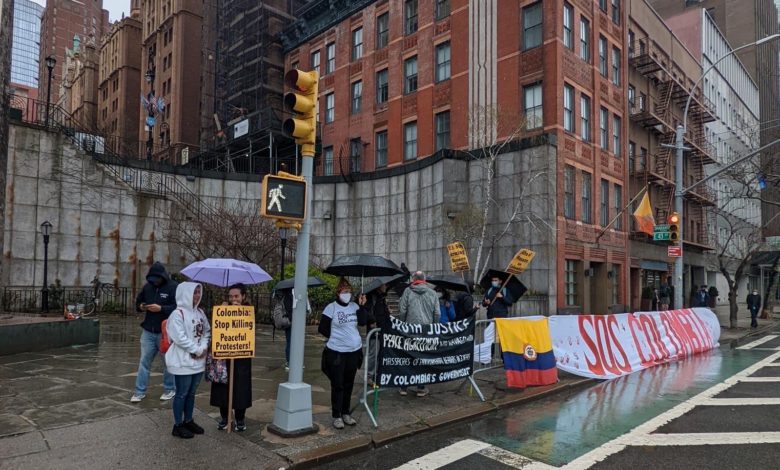
On April 12, around two dozen Colombian and anti-imperialist organizers coordinated two actions protesting the right-wing U.S.-allied leader of Colombia, Iván Duque, as he made two different political appearances in New York City. Both demonstrations condemned the Duque administration’s use of violence against protesters and demanded that the U.S. cease its role in upholding it. The actions were organized by local Colombian activists and attended by the Party for Socialism and Liberation.
In the morning, despite the pouring rain, protesters gathered across from the U.N. building in Manhattan, where Duque was scheduled to address the Security Council. As Duque’s motorcade pulled up to the U.N., protestors raised signs reading “S.O.S COLOMBIA” and “U.S. Stop Arming Massacre in Colombia.”
Protesters criticized the U.N.’s normalization of Duque’s violence and expressed the urgent necessity of peace for the Colombian people.
“Duque came to lie to the U.N. and didn’t allow the victims of the civil conflict to come and tell their side of the story,” explained Elizabeth Castaleda, who organizes with the Committee Of Human Rights and helped to coordinate the action. “We are here to protest because we can’t take war anymore.”
Later in the day, the protesters gathered outside of Columbia University, where Duque held a speaking engagement entitled “Peace with Legality.” At the action, activists waved signs and Colombian flags, engaging passers-by as the meeting occurred. Some approached the protesters in support, denouncing the meeting and expressed embarrassment at what their university had allowed to take place. As security amassed, the protesters assembled and chanted, “Duque is a liar!” and “Asesino [Murderer]!” as Duque passed by.
Repression tactics and undermining peace accords
These meetings come at a time of political upheaval in Colombia where Duque’s unpopular anti-poor and anti-worker policies have drawn massive resistance from everyday citizens of the country. Protests swept the country last year when Duque introduced an anti-worker tax reform bill, but eventually transformed into a challenge to Uribismo itself, the far-right political movement he’s a part of.
Much like his previous responses to social movements, Duque clamped down with extreme brutality through state forces like the army and the police. This violence has been especially concentrated against poor Afro-Colombian and Indigenous communities, and often covered up by the state.
This violent response has left dozens reported dead and even more disappeared, reminiscent of the darkest days of state repression faced by those struggling for change in Colombia in years past. Protesters have reported that state forces, as a strategy of repression and intimidation, have left victims wounded in the street for hours, before sending for medical help.
Some organizers also condemned Duque for undermining the 2016 Peace Accord between the government and the FARC rebel movement through these ongoing acts of state violence.
“It is hypocritical that Columbia University invites Ivan Duque to speak about peace, when his government has done nothing but to reverse the 2016 peace accords,” explained Yhamir Chabur, an organizer with the Troika Nation.
U.S. imperialism also to blame
While there has been widespread international condemnation of Duque’s heavy-handed repression tactics, Colombia has faced no sanctions or concrete repercussions whatsoever due to their position of favor with U.S. imperialism in the region.
Organizers made clear that the U.S. was just as responsible for the violence as Duque, sending the leader billions of dollars to funnel toward his repressive armed forces.
“This country is hiding the truth because Colombia is supposedly the best friend of the United States in Latin America,” said Castaleda. “It is a government that kills people to have their way and have their resources.”






